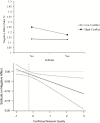Better Off Alone: Daily Solitude Is Associated With Lower Negative Affect in More Conflictual Social Networks
- PMID: 29924314
- PMCID: PMC6858825
- DOI: 10.1093/geront/gny060
Better Off Alone: Daily Solitude Is Associated With Lower Negative Affect in More Conflictual Social Networks
Abstract
Background and objectives: Older adults are often considered at risk for social isolation. Little is known, however, about how often older adults lack social contact (in person, phone, electronic) throughout the day, the implications of lacking contact (i.e., solitude), and whether the effects of solitude vary by the broader social context.
Research design and methods: Participants were from the Daily Experiences and Well-being Study (DEWS) which included 313 older adults (aged 65+) who completed baseline interviews followed by 5-6 days of ecological momentary assessments approximately every 3 hr.
Results: Individuals reported having no social contact (i.e., solitude) on 11% of the occasions. Solitude predicted lower negative and positive affect on those occasions. The solitude-negative affect link varied by social network quality. Solitude predicted lower negative affect among individuals with more conflictual social networks but not among those with less conflictual networks.
Discussion and implications: Overall, solitude may serve as an adaptive strategy for individuals embedded in demanding or irritating social contexts.
Keywords: Aging; Daily life; Social networks; Solitude; Well-being.
© The Author(s) 2018. Published by Oxford University Press on behalf of The Gerontological Society of America. All rights reserved. For permissions, please e-mail: journals.permissions@oup.com.
Figures

References
-
- Ajrouch K. J., Blandon A. Y., & Antonucci T. C (2005). Social networks among men and women: The effects of age and socioeconomic status. The Journals of Gerontology, Series B: Psychological Sciences and Social Sciences, 60, S311–S317. doi:10.1093/geronb/60.6.S311 - PubMed
-
- Akiyama H., Antonucci T., Takahashi K., & Langfahl E. S (2003). Negative interactions in close relationships across the life span. The Journals of Gerontology, Series B: Psychological Sciences and Social Sciences, 58, P70–P79. doi:10.1093/geronb/58.2.P70 - PubMed
-
- Antonucci T. C. (2001). Social relations an examination of social networks, social support. Handbook of the Psychology of Aging, 3, 427.
-
- Cacioppo J. T., & Patrick W (2008). Loneliness: Human nature and the need for social connection. New York, NY: WW Norton & Company
Publication types
MeSH terms
Grants and funding
LinkOut - more resources
Full Text Sources
Other Literature Sources

